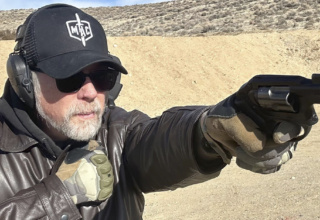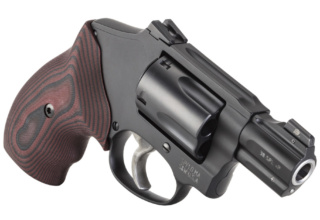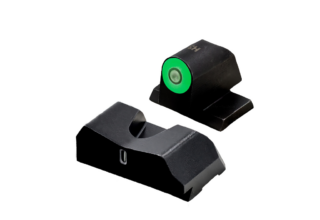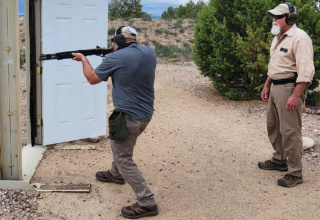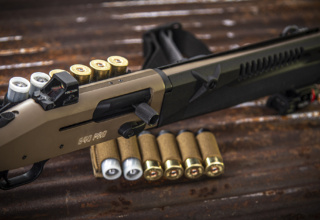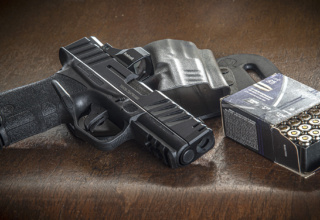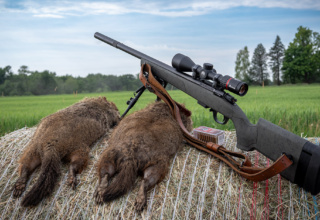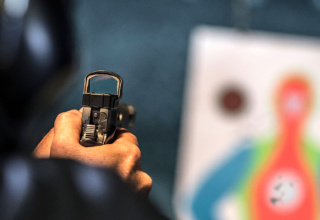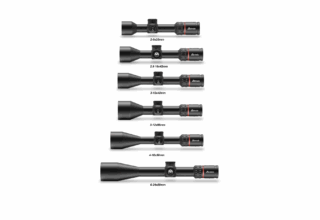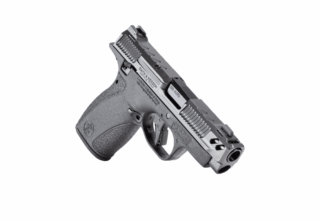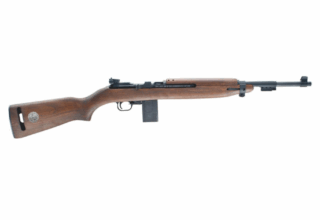Looking to get on target faster with your defensive handgun? An “express sight” may be your ticket
by Rob Reaser
Students of the handgun know that, eventually, new sights come into the picture. That’s especially true for pistols designated for home/personal defense and competition. The first question is always, “Which sight is best?”
An experienced shooter friend of mine is all about minimalism, and he’s quick to roll out the theories to back his position. Other range acquaintances are just as fast to extol the virtues of this sight configuration or that one. My dad favors bold, white, three-dot alignment on his handguns while I can’t stand them. Others are all about red dots. One fancies a laser (the fact that his open sight handgun groups resemble buckshot hits at 50 yards may have something to do with his preference).
Still, the big question remains.
My answer is always, “The best sight is the one that works unfailingly and allows you to shoot the most accurately and efficiently for the condition.”
The “condition” part is key, in my opinion. In ample light, I favor a standard square front sight post and a healthy U-notch rear for target shooting or defense drills. No white dots, no colored sight rings — only a black sight silhouette on the target. It’s just what works best for me.
For my carry gun…different story. I know that in an up-close defensive engagement, I won’t likely have the time or the need to make a target-grade sight alignment. Things will be happening too close, too fast, and under too stressful conditions for that to work…for me. That’s why all my carry pistols are tritium sights with a prominent white or orange sight ring up front. Regardless of the lighting condition, I’m going to know where that front sight is covering and, subsequently, where the barrel is pointing. Good to go bang. Should the need arise and I have the time and the distance to acquire a more finely tuned sight picture, my sight system will still allow that. In short, for my defensive, do-it-all pistol, I want a front sight that is bold and visible across the ambient light spectrum and that ensures I can get on target quickly at close range.
One sight system that fits that bill has been around for a while in handgun circles and even longer on rifles. We’re talking about “express sights.”
As the story goes, express-style sights were born out of the African bush, where client hunters and PHs needed a sighting system that was both accurate and FAST. You know, like when a Cape Buffalo is charging you, fully intending to turn you into a greasy pile of smush, and the time to execute your only shot is down to the seconds you can count on one hand.
Unlike conventional open sights, where you align the front sight post in the center of the rear sight notch and level across the top, an express sight simply centers a prominent front sight bead into the shallow “V” of the rear sight. The idea behind this design is to speed up sight alignment and sight picture acquisition. It’s a save-your-bacon solution intended for close encounters where speed is of the essence.
As you can imagine by looking at the sight profiles above, express sights (right) tend not to be as precise on sight alignment as conventional open sights (left) — particularly when employed on a handgun, where an already short sight radius handicaps accuracy. That is not to say express sights are inaccurate for the task for which they were designed: fast sight picture acquisition and getting on target quick enough to get the job done. My close-range (10-yards) draw-aim-shoot comparisons of conventional sights and express sights reveal equivalent performance in terms of shot groups. As for getting my sight picture, the express sight brings it on noticeably quicker.
Would that work for you? I can’t answer that, and neither can you until you try. If you have handguns to spare and some extra jingle in your pocket, now might be the time to investigate express sights for your defensive handgun.
I recently acquired a set of express sights from HIVIZ. These are part of their new Lightwave H3 series of sights, which combine a tritium (glow) element with fiber optics to deliver all-light visibility. The tritium/fiber optic elements are integrated into a steel housing to protect the tritium capsules and fiber optics, and are direct-fit replacements for OE sights covering GLOCK 45 ACP/10mm, GLOCK 9mm and .40 S&W, and S&W M&P Shield pistols. All sight models come with a white front ring around the fiber optic and either a green or orange vertical line for the rear sight.
While not necessary during the daylight, the vertical rear sight alignment element is critical in low-light conditions. My experience with this sight revealed quick sight alignment across the light spectrum, from near dark inside and outside to full sunlight. As for target alignment, it’s quite simple. Once the sights are correctly aligned, with the white ring nestled comfortably in the rear sight valley (daytime) or the ring sitting atop the vertical line on the rear sight (low light), simply cover the intended point-of-impact with the front sight and shoot.
This is really fast and simple on steel or defensive silhouette targets. On bullseye targets, the front sight covers the circle, so there is a bit of fudge factor there. But remember, precision target shooting is not what express sights are about. If that’s what you want, stick to whatever works best for you in that condition. For defensive applications, I’ve found this system to work great for fast, close-range engagement.
How hard is it to install the Lightwave H3 express sights on a GLOCK or GLOCK-style slide? Not at all, if you have the right tools. You’ll need a GLOCK-compatible sight pusher, a GLOCK front sight tool, some denatured alcohol, and some blue Loctite. That’s it.
Here’s how we installed the HIVIZ Lightwave H3 express sights onto a custom Rival Arms 17 G3 slide assembly.
GLOCK-style sights utilize an interference dovetail fit and must be pressed on with a sight pusher designed for this application. Begin by sliding the rear sight into the dovetail. It should go about halfway into the dovetail by hand. If you encounter problems here, the base of the sight may need to be GENTLY taken down with a flat file or 600-grit paper until the sight will go on halfway.
Push the sight onto the slide until it is in perfect center alignment with the slide. Be careful not to push the sight on too far. If you do and then have to back the sight out, the interference fit may be compromised.
Measure both sides of the sight against the edge of the slide. You want to achieve equal distance. Once the sight is centered, you will need a range evaluation to ensure correct “zero.”
Clean the front sight screw and the screw hole in the bottom of the front sight with denatured alcohol to remove any grease or oils that could prevent the Loctite from forming a bond.
Install the front sight into its slot in the slide.
Apply a small amount of blue Loctite to the front sight screw threads. Here, we are using a Real Avid 4-in-1 Tool for GLOCK. It has a magnet in the driver that makes working with this little bugger a breeze.
Start the front sight screw into the sight, working from the bottom of the slide. Be careful not to cross-thread the screw.
The Lightwave H3 express sight comes tapped for a set screw (included). Although we did not find this necessary due to the perfect interference fit of the sight’s dovetail, it is added insurance that the sight will stay where we need it.
To learn more about handgun sight solutions from HIVIZ, check out their website.














